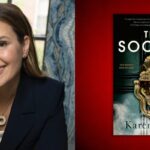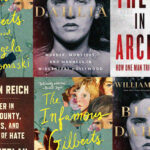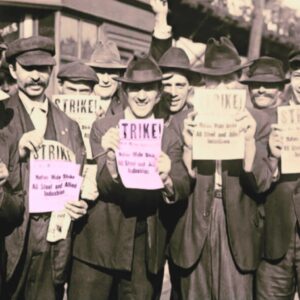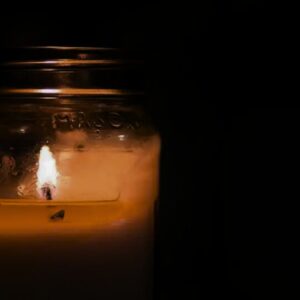
For Viv Albertine, Honesty Is As Punk As It Gets
Judy Berman in Conversation with the Writer and Legendary Member of The Slits
Just as Viv Albertine was being reborn, her mother was dying. Born in Australia and raised in London, Albertine had entered the public eye—and taken more than her share of shit from that public—in the mid-70s as the guitarist of the pioneering all-female punk band The Slits. Over the next four decades, she became a filmmaker, a wife and mother, a divorcée and a cancer survivor, before returning to music. She released her debut solo album, 2012’s The Vermilion Border, at age 57. Two years later, she published an arrestingly honest, life-spanning memoir titled Clothes, Clothes, Clothes. Music, Music, Music. Boys, Boys, Boys. At a time when men were still getting most of the credit for punk, she had indelibly scratched her name into history.
On the night of the book’s release party, as Albertine scurried around a venue in King’s Cross making last-minute preparations to launch her new career as an author, her younger sister, Pascale, called to say that their beloved 95-year-old mother, Kathleen, was just minutes away from dying. So, she did the only thing she could possibly have done—she left the party with her teenage daughter, Vida, and raced to the hospital. It took Albertine three years and a second book to process what happened between the four women in Kathleen’s room that night.
To Throw Away Unopened is a far less traditional memoir than Clothes, Clothes, Clothes. Paced like a thriller, this remarkable book jumps back and forth between Albertine’s childhood and family history and her life in recent years. When she stumbles upon diaries documenting her parents’ messy divorce, a sort of detective story emerges. Interspersed between these vignettes like the return of the repressed is the harrowing story of Kathleen’s final night on earth, which unfolds just one paragraph at a time. Epigrams sourced from other books, articles, poems and conversations with friends and relatives subtly contextualize Albertine’s blunt reflections within a universal canon of women’s experiences with family, mourning and, above all, righteous anger.
On a New York morning so unseasonably cold and misty we could have been in London, I called Albertine at her Manhattan hotel room to chat about To Throw Away Unopened, domestic noir, living by feminist and punk principles, and her liberating decision to give up on romance.
*
Judy Berman: You’ve been best known throughout your life as a musician, but you’ve also studied visual art and worked in film. Did you always want to write books, too?
Viv Albertine: No, not at all. I never thought I’d write a book—it seemed like an impossible goal. The first book came about slowly, because people were saying, “Oh, you should write about the punk days.” But it wasn’t until I picked up the guitar again in my fifties that I thought, “This makes an interesting sort of narrative arc.”
Writing that took such an emotional toll, I couldn’t imagine writing another book. Then I found myself missing going to the table every day and having this book need me for four hours. My daughter was growing up. That made me think, “I’m gonna start a new project.”
“I was born in such patriarchal times, and anger was considered incredibly unfeminine.”
I started off thinking I’d write a thriller mixed with psychogeography of where I live in East London, but bit by bit, the nonfiction side took over. I didn’t have the skill or the interest to keep manufacturing reasons for the protagonist in the fiction bit to do this or that. In the end, reality took over again—my mother died, and the book just sort of evolved. I kept working in things that were happening. I found her diary, I found my father’s diary. Over the three years that it took to write, the book kept changing its shape until it became the right thing and I knew it was ready.
JB: Even though you ended up writing a memoir, the book still has the elements of suspense you mentioned. I’m tempted to call it a “personal thriller.”
VA: I read a lot of domestic noir—female-led thrillers that are set in a domestic sphere [and deal with] emotional and psychological situations. I was very aware that the book was a detective story. In my head, I coined the phrase “mem-noir,” and I was very conscious of the pacing and structure of the noir books as I wrote, because I always want the reader to turn the page.
JB: The central narrative of the book takes place over a matter of hours on the night your mother died. Did you originally write that as one continuous piece?
VA: No, because I couldn’t bear to even think of it in more than little bursts. It’s been four years now since my mum died, and I still can’t think about it in a linear way. That’s probably a human coping mechanism: When something traumatic happens, it comes back to you in little bursts—and that’s how the [fragmented] structure of that traumatic night came about in the book. I didn’t want to impose a structure that was merely stylistic; it should have some sort of emotional resonance.
JB: The book’s epigram, from the diary of Louise Bourgeois, is striking: “To be an artist is to guarantee to your fellow humans that the wear and tear of living will not let you become a murderer.” What does that mean to you?
VA: It means that creativity is a channel for your anger and your fury. A woman said it, and as a woman I believe it, because women do have a lot of anger and fury. More women should be creative—not only does the world need it, but the women need it. For me, it was saying that if I hadn’t had punk and then my filmmaking and then the writing of the books and the later music, I don’t know what would have become of me and my huge reserves of anger. At least these outlets turn it into something positive (and hopefully useful for other people), rather than a destructive force that turns in on itself.
JB: That quote is one of dozens in the book, many by women writers. Why was it important for you to include all of those voices in your personal story?
VA: It’s giving credit to other writers and artists who’ve been an anchor for me at bad times. There’s a feminist thread running through the book as well—an undercurrent of my thoughts and my acknowledgement of female artists and what they’ve meant to me over the years.
I’ll also credit a friend, or an aunt, or a grandmother, or my mother, on exactly the same level. Maybe they’re not that educated, but they have worldly wisdom and say clever things that mean a lot to me. I want to level the playing field and say, “Yeah, my friend Tracy’s quotes are just as important as Louise Bourgeois’.” Your grandmother can be just as important as some highfalutin author who’s got an MFA. I wanted to give them equal billing.
JB: That feminist angle also comes through in the way you write about your mother and her life, and how the older women in your family taught you how to be an independent person.
VA: I discovered a lot about my mother—and about how I became this angry person—as I wrote. And I thought, “If I’m gonna write honestly about myself, I’m going to have to explore where this anger and resentment I feel comes from.” It took years to delve into that, and I did trace most of it back to my mother and the very patriarchal times she was born into, and the very patriarchal legal system that meant she lost custody of her first son—all the things that added up to her anger, which she then filled me with. My story is built on the foundations of my mother’s story.
“More women should be creative—not only does the world need it, but the women need it.”
I didn’t understand why I was so angry with her once she died. We’d been incredibly close, and it was like my body or my subconscious had registered unfairness or cruelty that I couldn’t actually cope with facing while she was alive. As soon as she died, my subconscious and my body became so furious with her, and the book helped me work out why.
JB: Going through your parents’ papers also cleared up some of your confusion about why you’d always had such a contentious relationship with your sister.
VA: Yeah, that was one of the detective strands in the book: How do these two women end up being so angry with each other—so against each other when we should have been so for each other? It was shocking when I finally did unravel it all, in a domestic-sphere way. It’s like when you drop the pebble in the pond: That history rippled out, and it affected the way my sister and I have had relationships, how we think, how we relate to each other and the world.
JB: Ultimately, you seem to realize that you don’t blame your sister, but you also can’t have a relationship with her. Was it important for you to leave that messy ending intact?
VA: Yeah, because I wanted to explore that terrible pressure from society to have a working family at all costs. I’m asking, “If your family, or members of your family, are detrimental to your mental health, is it OK to walk away from them?” It shouldn’t even be a question, but I think it is in this society. I wanted to say, “I think you have to walk away from whoever in life is mentally disruptive and negative for you. And if that happens to be a family member, so be it.”
[The same goes for] romance and partners and love and marriage. Instead of things you stumble across or don’t stumble across, they’ve become this absolute necessity—you’re not part of society unless you have them. You’ve failed. I’ve written books, I’ve made albums, I’ve had an interesting life. But I still get mostly male interviewers saying, “What about love? You’ve given up on that. Isn’t that extreme? Isn’t that a failure?” And yet, why isn’t love quite low down on the list of things to achieve in life? I’ve got great friends. It’s great to have people around you, if you’re lucky. But solitariness is just as appealing.
JB: It’s funny that men have been asking you whether giving up on love is a failure, because I was planning on asking, is it liberating?
VA: It’s life-changing, and I wish I’d gotten to this mindset 30 years ago. I was talking to a young woman yesterday, and I was saying it’s changed what I wear, how I choose shoes—so it’s changed how I walk. It’s changed my bank balance because now I don’t have to remove hair here, there, and everywhere. It’s changed how many hours I can give to my work. It’s tripled my creative output. I’ve met so many interesting women. It’s affected my female friendships; they’ve become so strong, interesting, productive. It’s been highly liberating, and I hope I’ve got enough years of health ahead of me to explore it even more.
JB: Your history as a punk comes up from time to time in the book. Do you feel that that identity has shaped your life?
VA: I think, first, my mother made me someone who would be attracted to what became known as the punk movement. I feel her presence in everything I do. And then The Slits were the first way that I managed to express myself artistically. So punk is a huge part of my life, and it was a way of being and thinking that really resonated with me. Most people who were drawn to punk weren’t in it because it was anything cohesive. It was just a group of people who were attracted to the same ideals of honesty and giving a voice to people who hadn’t been given one before. I carry those ideals with me whether I’m writing a book or talking to someone I meet in the street.
JB: You committed an act of punk honesty a few years ago, at a punk exhibition in London, where women’s contributions were being erased. You crossed out the names of three male punk bands and wrote in The Slits, X-Ray Spex, and Siouxsie and the Banshees. It reminded me of something Kim Gordon once said: “Girls invented punk rock, not England.” As a female punk from England, does that idea resonate with you?
VA: I think girls within punk rock were what was interesting about punk rock, because guys in punk rock were just rock bands. It was nothing new, what they were doing. When I talk about Siouxsie and the Banshees, X-Ray Spex, The Slits, The Raincoats—we were not only breaking down barriers that had existed since rock started in the 1950s, we were changing the sound of music and the visuals of music and the goals that girls that could aspire to. Not that we, and especially The Slits, got much acknowledgment for that till 30 years later.
“I think girls within punk rock were what was interesting about punk rock, because guys in punk rock were just rock bands. It was nothing new, what they were doing.”
JB: I’m 33 years old, and I grew up never doubting that women could be in punk bands, or rock bands, or play guitar. Do you think that’s the legacy of women in punk?
VA: Oh, absolutely. When The Slits performed, in ’76 and ’77, there were hundreds of people in every audience who had never have seen a girl onstage playing drums or guitar or bass before. I hadn’t seen it myself, so imagine how extraordinary that was for the audience. They just stood there with their mouths open. Everyone wrote in the papers, “Girls don’t look good with guitars.” They didn’t understand our songs or our lyrics. We were considered unimportant and stupid.
We wove playground chants into our songs, we knew we were good and we knew what we were doing, but it really did take about 30 years for anyone else to catch on, and that’s a shame. Because in the 70s, that’s when we were really radical. Girls in bands are an everyday thing now, but the first man through the wall gets bloody, as they say.
JB: The three cornerstones of your work, from the 70s through the present, seem to be anger, honesty, and feminism. Right now, we’re in a moment when all of those things are working together to drive unprecedented change. Is that thrilling to you?
VA: It’s fantastic. Because it’s only in the last couple of years that I’ve heard women start to speak about their anger. All my life, except in those few punk years, I felt I had to hide it. I felt ashamed when I started the book, and scared of writing about being an angry person.
I was born in such patriarchal times, and anger was considered incredibly unfeminine. Throughout my childhood and teens and 20s, anger in a woman equaled “ugly.” And the worst thing you could be as a woman in this fucking capitalistic world was ugly. Men still think to call you ugly or not be attracted to you is the biggest insult in the world. It would be so great for girls and women to get to the stage where being considered ugly did not matter a fuck to them.
Judy Berman
Judy Berman is a critic, journalist and editor in Brooklyn. She writes about film, music, television, and books for publications including The New York Times, Pitchfork, The Nation, The Baffler and The Outline. Find her on Twitter @judyberman.



















